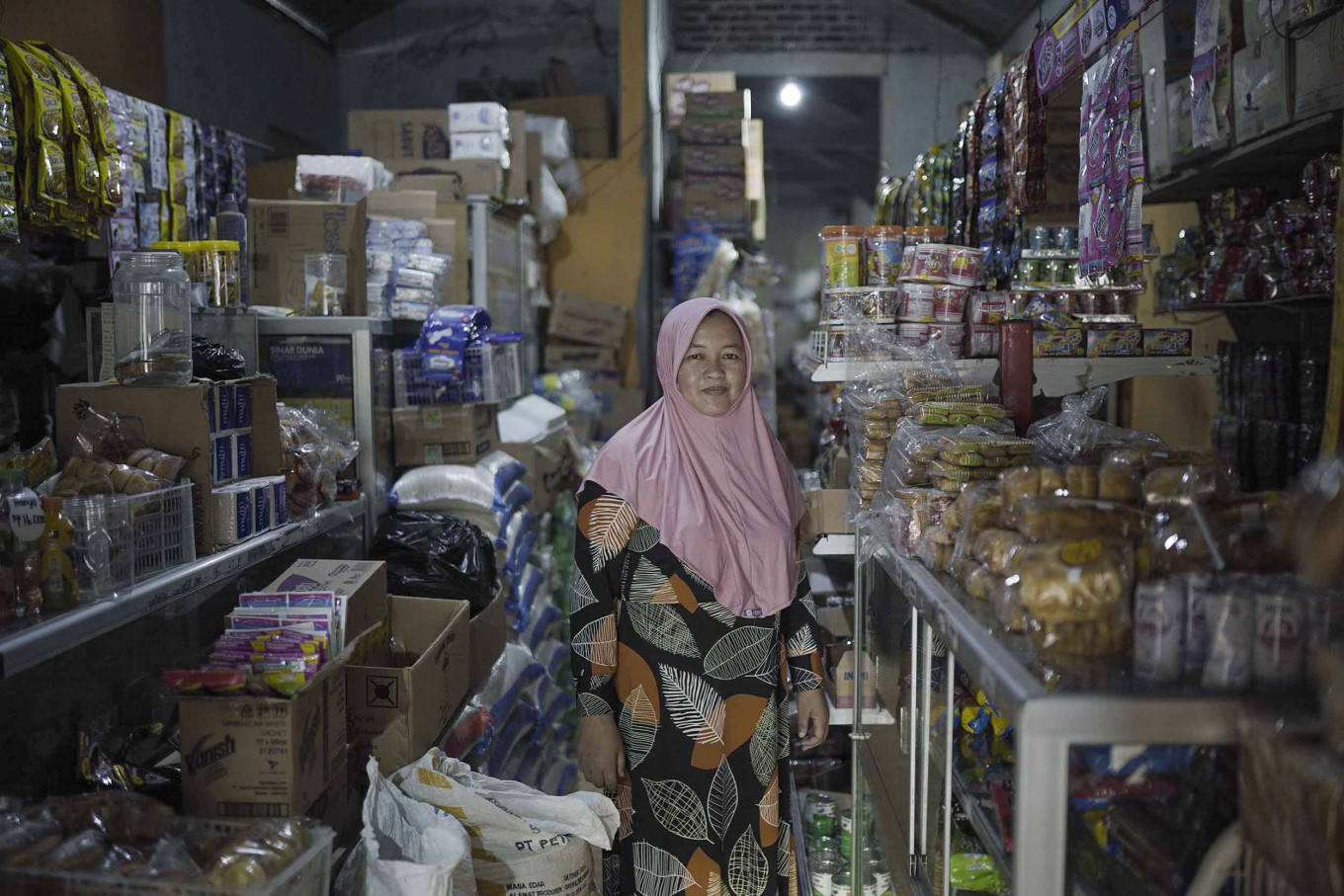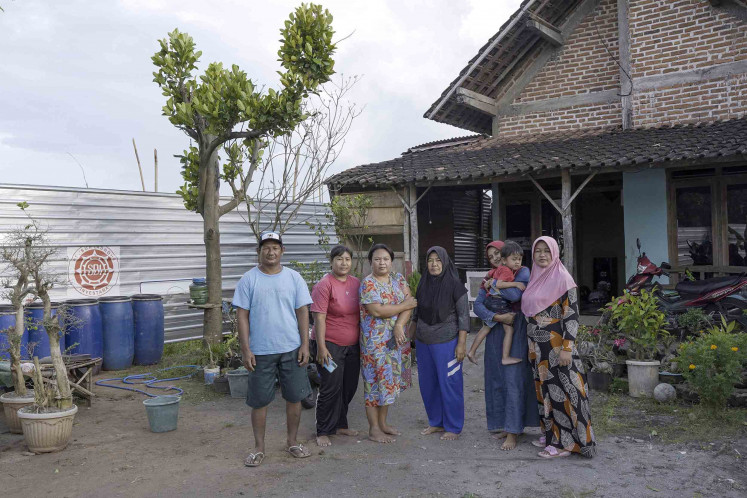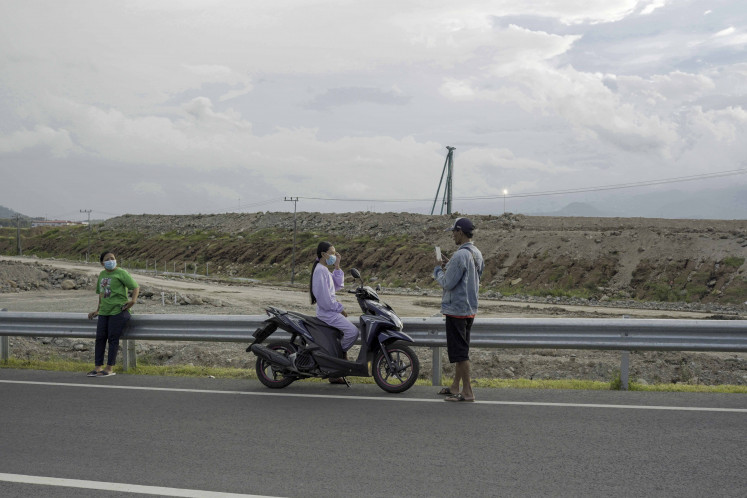Popular Reads
Top Results
Can't find what you're looking for?
View all search resultsPopular Reads
Top Results
Can't find what you're looking for?
View all search resultsReady to live in darkness: Villagers around Kediri's new airport say they'll never leave
While many villagers around the new airport under construction in Kediri have sold their land, a few said they'll stay forever, no matter what.
Change text size
Gift Premium Articles
to Anyone
While the constant noise caused by the construction of Kediri's Dhoho Airport bothers most of the villagers who live nearby, some have managed to block out the noise.
Yoni Madu, a 42-year-old resident of Bulusari Selatan village, who lives just 200 meters from where the construction is happening, said the "chaos" was something he has learned to live with.
"I’ve been hearing this noise for a year, so it finally feels normal. I couldn't sleep in the past, and the scattered dust gave us breathing difficulties. But now it has become a normal thing. We've already adapted," Yoni said.
The massive development project is part of a planned multi-airport system developed for the East Java region that is supposed to be finished by 2022. Still, it has felt like an endless process for long-time inhabitants of the six villages in the area, who have experienced a downfall in their quality of life and livelihood.
In Yoni's village, only eleven houses remain where there used to be more than 50. Those who left did so after selling their homes to the developer. According to Yoni, they did so at a losing price based on dodgy calculations.
"I can't believe that [the developers] priced the land at Rp 10.5 million per 14 meter square. I know that the market price of land here can reach Rp 17 million to Rp 18 million," Yoni said.
Today, a silver zinc wall put up by the developers surrounds the village, blocking many of its access routes and making everything feel even more cramped than usual.
Yoni said the lure of the money offered by the contractor does not equal the memories made in his house, a home his family has lived in for three generations.
Yoni said that if he did sell his house, he would not have enough to build a new home large enough to accommodate his own family and his many relatives.
Sweet Promises
Yanti Liswati, 45, manages a busy grocery store in the village. While some routes into Bulusari Selatan (also known as South Bedrek) village have been blocked by the developer, killing many small shops there, Yanti's shop has managed to survive through a mixture of luck and neighbors who like the relatively low prices. Other traders often buy goods from her to resell. She said that handing over her land to the airport was too much of a gamble and that setting up everything from scratch elsewhere did not seem worth it.
It hasn't been easy. Yanti's eyes filled with tears as she recalls how, in August 2020, the developer unexpectedly leveled one of her properties to the ground. There was a small musholla (prayer area usually located outside a mosque) that most of the villagers used to pray in.
Her husband, tempted by the money he could use to go on the haj, had signed an agreement without her knowledge.
"The day before (the developer tore down the property), people from the airport came to the house, and I offered them a price. However, there was no official agreement yet. I went inside to prepare tea (for the guests), but the developers led my husband to the musholla. They convinced him into signing," she recalls.
By the time she came out, construction vehicles were already tearing down the building.
"I could feel my heart breaking into pieces. It felt like I suffered the loss of a family member," Yanti said.
Anis, Yanti's younger sister, chimed in to say that the developer had promised to build a new musholla, something they have yet to do. Accepting that they have been somewhat duped, the village head asked residents to pool funds to build another musholla.
"What I regret is their empty promise," Anis said about the developer representatives who visited them.
"If you don't want to build it, you should not have destroyed it. Both parties (the villages and the developers) are Muslims. It just doesn't sit right with me, seeing how they can't fulfill their promise," Anis said.
According to Anis, the airport had allegedly cajoled residents into signing a contract for a "business loan." In early 2019, developer representatives presented villagers with blank papers to sign, telling them that anyone who signed would receive a Rp 5 million loan. A few days after that, those who did sign received a notice stating that the paper represented the down payment and an agreement to sell their land unless they were able to immediately return the Rp 5 million.
"We were shocked, but we couldn't refuse. (We) are poor, most of the money had already been used," Anis said.
Fortunately, the villagers banded together and crowdfunded to cover each other's "loans." However, most did eventually accept the following offers and left the village.
The Jakarta Post has attempted to contact Iwan Tri Cahyono, PT Gudang Garam’s head of public relations, and Maksin Arisandi, director of PT Surya Dhoho Investama (SDHI), a Gudang Garam subsidiary that handles the airport’s construction, but has not received any immediate response.
Not scared
Yanti, Anis, Yoni and the other residents who remain said they are not afraid of intimidation tactics. They have even managed to psychologically view the attempts to push them out as a good thing. Anis said the zinc fence made them feel like living in an exclusive neighborhood paid for by the state.
"We're grateful for it," said Anis, arousing laughter from Yanti.
Yanti and Yoni said that, if one day the developer blocked off the access to their main road and turned their electricity off, they would start making bonfires. Yanti told The Jakarta Post that they could survive living in darkness. Instead of being sad, they feel that when that time comes, they will think of it as a moment to reminisce about their childhood and the togetherness shared between neighbors.
Yanti said: "If this development is intended to improve the economy of the poor, why are we becoming victims again? Why are they sacrificing poor people again? Stop it; we just want to relax. We just want to let it go, but we still don't want to move, whatever the stakes are."
This is the second part of a two-part series.













